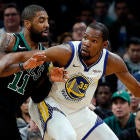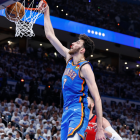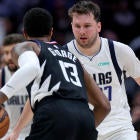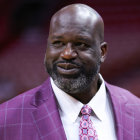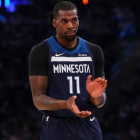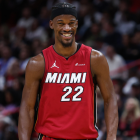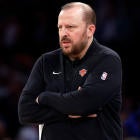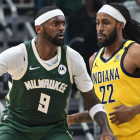There is a significant amount of risk that the Brooklyn Nets are taking on by spending nearly a third of a billion dollars on four years of Kevin Durant and Kyrie Irving.
And not just because Durant's four years are really only three years, since his upcoming season will be spent rehabbing the Achilles tendon injury, meaning the Nets are paying Durant $164 million for only three years of actual basketball.
One risk is that Durant is far from guaranteed from coming back as the same player (or close to the same player) he was before his Achilles injury. That injury has been a career-killer for so many NBA players before him (Isiah Thomas, Patrick Ewing, Kobe Bryant). The Nets are betting that Durant comes back more like Dominique Wilkins. Wilkins injured his Achilles in the middle of his 10th NBA season and averaged 29.9 points per game in his first season back.
Another risk is that the famously sensitive Durant will be able to coexist with the famously difficult New York media.
Perhaps an even bigger risk is how the $142 million bet on Irving will pan out. Around the league, the most common phrase used to describe Irving is that he is, ahem, "a unique dude." That means he's kind of weird, and kind of difficult. It was an open secret for much of this past season that Irving was the reason that an incredibly talented Celtics team was such a bunch of underachievers.
Has Irving learned any lessons from his failed relationship with LeBron and then his failed move to Boston? Can the culture that Sean Marks and Kenny Atkinson have worked so hard to institute in Brooklyn -- a culture that's been founded on drafting and developing undervalued players (Caris LeVert, Jarrett Allen) and rehabilitating the careers of scrap-heap players (Spencer Dinwiddie, Joe Harris) -- adjust to bringing two alpha dogs into the locker room?
All these are very big risks, questions that remain unanswered heading into the 2019-20 season.
And yet, risks and all, Marks deserves an A+ grade for the entirety of the NBA offseason solely because of the signings he made on Sunday, the first day of NBA free agency.
Last season, the Nets were a nice story. They were a scrappy bunch that made the playoffs for the first time in four years, a six-seed that gave the Philadelphia 76ers a bit of a scare by winning Game 1. The ceiling for that particular group was not particularly high. Hell, they may have reached that ceiling last season.
What that group did do was send a message to the rest of the NBA that the Nets had established a winning culture. It was that group that paved the way to get Durant and Irving.
Now D'Angelo Russell will be replaced with Irving, a far better basketball player. Durant gives the Nets a player who, until his initial injury in the second round of the playoffs, looked like the best basketball player on Earth. If the Nets can keep the same roster for the 2020-21 season -- which is far from certain, because Caris LeVert and Joe Harris will both be free agents -- this feels like a team that should be considered one of the teams with the very best odds to win the 2021 NBA title.
Marks took the Nets job in the middle of the 2016 season. Only the 10-win Philadelphia 76ers and the 17-win Los Angeles Lakers had worse records than the 21-win Nets that season. Over the next two seasons, the Nets won 20 games, then 28. Marks instituted a player-first culture and accumulated assets despite having one hand tied behind his back in the wake of that disastrous Boston Celtics trade by the previous regime. It was an incredible feat of management that brought the Nets to last season's 42-win team.
Now, with two max slots available, Marks calculated that this offseason was the time to take a risk: On an injured superstar, and on a talented malcontent.
Sunday might someday be looked at as the single-most important day in Nets history.
And, I suppose, it could someday be looked at as a way-too-risky series of moves that never quite panned out.
Sunday was certainly a risk for Marks.
And it's a risk you take every time.













